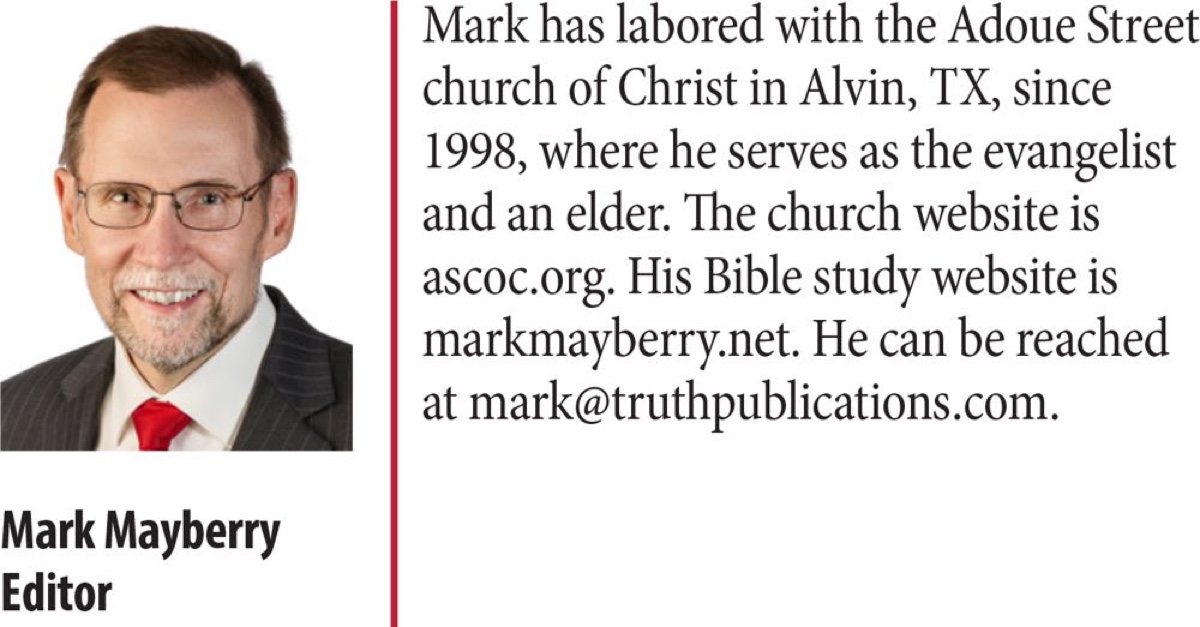Synopsis: The theme of the July 2022 issue of Truth Magazine is “Face to Face.” Let us consider several significant biblical passages that contain this phrase, while making application to current cultural conditions.
Life is returning to a semblance of normality after the two-year shutdown occasioned by the COVID crisis. Now is the time to refocus, regroup, and recommit ourselves to personal engagement with our brethren. This series of articles emphasizes the need for affirmative interaction among God’s people.
Satan seeks to divide and conquer. He wants us to feel isolated and outnumbered, demoralized and defeated. Conformity and assimilation are the siren song by which he would rob us of purity and power. We need to fight against the worldly pressures that lead people away from God. We gain great strength from our brethren. As Solomon said:
Two are better than one because they have a good return for their labor. For if either of them falls, the one will lift up his companion. But woe to the one who falls when there is not another to lift him up. Furthermore, if two lie down together, they keep warm, but how can one be warm alone? And if one can overpower him who is alone, two can resist him. A cord of three strands is not quickly torn apart (Eccl. 4:9-12).
By focusing upon the power that is derived from “face to face” relationships, let us fill (or refill) a void that has been created in our lives. Instead of allowing an upside-down world (filled with carnality, chaos, and conflict) to control our lives, believers possess the power to actively, purposefully, and passionately be conformed to the image of Christ. Through obedience to the gospel and by cultivating the bonds of brotherhood, we can live with meaning and hope—and be “the light of the world,” as the Lord intends us to be.
The theme of the 2022-07 July issue of Truth Magazine is “Face to Face.” Consider the following significant biblical passages that contain this phrase:
Before and after his sojourn in Haran, Jacob/Israel experienced a close encounter with God. The first occurred at Bethel, where he exclaimed, “How awesome is this place! This is none other than the house of God, and this is the gate of heaven” (Gen. 28:10-22, esp. v. 17). The latter occurred at the Jabbok, where—after wrestling with an angelic representative all night, and the subsequent discussion that occurred—Jacob called the place Peniel, “I have seen God face to face, yet my life has been preserved” (Gen. 32:24-30, esp. v. 30).
Then Jacob was left alone, and a man wrestled with him until daybreak. When he saw that he had not prevailed against him, he touched the socket of his thigh; so the socket of Jacob’s thigh was dislocated while he wrestled with him. Then he said, “Let me go, for the dawn is breaking.” But he said, “I will not let you go unless you bless me.” So he said to him, “What is your name?” And he said, “Jacob.” He said, “Your name shall no longer be Jacob, but Israel; for you have striven with God and with men and have prevailed.” Then Jacob asked him and said, “Please tell me your name.” But he said, “Why is it that you ask my name?” And he blessed him there. So Jacob named the place Peniel, for he said, “I have seen God face to face, yet my life has been preserved” (Gen. 32:24-30).
Moses shared a close relationship with God: “the LORD used to speak to Moses face to face, just as a man speaks to his friend” (Exod. 33:11; cf. Deut. 34:10-12).
Thus the LORD used to speak to Moses face to face, just as a man speaks to his friend. . . (Exod. 33:11a).
Since that time no prophet has risen in Israel like Moses, whom the LORD knew face to face, for all the signs and wonders which the LORD sent him to perform in the land of Egypt against Pharaoh, all his servants, and all his land, and for all the mighty power and for all the great terror which Moses performed in the sight of all Israel (Deut. 34:10-12).
The openness of their relationship is reflected in God’s rebuke of Miriam and Aaron for unjustly criticizing Moses:
He said, “Hear now My words: If there is a prophet among you, I, the LORD, shall make Myself known to him in a vision. I shall speak with him in a dream. Not so, with My servant Moses, he is faithful in all My household; with him I speak mouth to mouth, even openly, and not in dark sayings, and he beholds the form of the LORD. Why then were you not afraid to speak against My servant, against Moses?” (Num. 12:6-8).
After suffering the consequences of their rebellion, the Lord would plead with the remnant of His people “face to face,” calling them to repentance, recommitting them to the covenant (Ezek. 20:33-38).
“As I live,” declares the Lord GOD, “surely with a mighty hand and with an outstretched arm and with wrath poured out, I shall be king over you. I will bring you out from the peoples and gather you from the lands where you are scattered, with a mighty hand and with an outstretched arm and with wrath poured out; and I will bring you into the wilderness of the peoples, and there I will enter into judgment with you face to face. As I entered into judgment with your fathers in the wilderness of the land of Egypt, so I will enter into judgment with you, declares the Lord GOD. I will make you pass under the rod, and I will bring you into the bond of the covenant; and I will purge from you the rebels and those who transgress against Me; I will bring them out of the land where they sojourn, but they will not enter the land of Israel. Thus you will know that I am the LORD” (Ezek. 20:33-38).
As the apostle Paul described things of enduring value (i.e., faith, hope, and love—compared to the temporal gifts of the Spirit over which the Corinthians were squabbling), he emphasized the surpassing value of divine revelation, by which we can know God’s will (and also be known by Him). When the inspired apostles and prophets had completed their revelatory work, we would know (and be known) fully, i.e., “face to face” (1 Cor. 13:12).
For now, we see in a mirror dimly, but then face to face; now I know in part, but then I will know fully just as I also have been fully known (1 Cor. 13:12).
John, who became known as the apostle of love, sought a close relationship with the disciples to whom he wrote:
Though I have many things to write to you, I do not want to do so with paper and ink; but I hope to come to you and speak face to face, so that your joy may be made full (2 John 12).
I had many things to write to you, but I am not willing to write them to you with pen and ink; but I hope to see you shortly, and we will speak face to face (3 John 13-14).
Each member of the Godhead is a distinct personality; yet they share the same purpose, thought process, values, approach, etc. Thus, Jesus (the Son) said, “I and the Father are one.” The body of Christ is composed of different members with unique talents, who (though being joined in a body) contribute to the improved functionality of the whole. The expression “face to face” suggests close relationships. Although believers have distinct personalities and come from different backgrounds, they share fellowship in the gospel of Jesus Christ. The relationship that Christians enjoy is not occasional or superficial, but persistent and profound. Therefore, let us remember the importance of “face to face” involvement in periods of worship and Bible study, in reaching the lost and restoring the fallen, in developing disciples and showing hospitality. We encourage you to study these topics with an open Bible and a receptive spirit.


